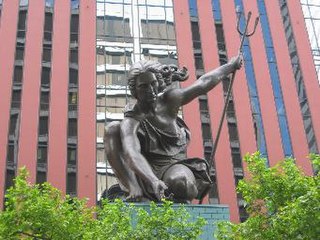
Portlandia is a sculpture by Raymond Kaskey located above the entrance of the Portland Building in downtown Portland, Oregon. It is the second largest copper repoussé statue in the United States, after the Statue of Liberty.

The Marquam Bridge is a double-deck, steel-truss cantilever bridge that carries Interstate 5 traffic across the Willamette River from south of downtown Portland, Oregon, on the west side to the industrial area of inner Southeast on the east. It is the busiest bridge in Oregon, carrying 140,500 vehicles a day as of 2016. The upper deck carries northbound traffic; the lower deck carries southbound traffic. The Marquam also has on and off ramps for Interstate 405 on the south end of the bridge, while the terminus on the east bank of the river is near the interchange with Interstate 84.
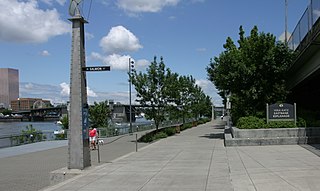
The Eastbank Esplanade is a pedestrian and bicycle path along the east shore of the Willamette River in Portland, Oregon, United States. Running through the Kerns, Buckman, and Hosford-Abernethy neighborhoods, it was conceived as an urban renewal project to rebuild the Interstate 5 bicycle bypass washed out by the Willamette Valley Flood of 1996. It was renamed for former Portland mayor Vera Katz in November 2004 and features a statue of her near the Hawthorne Bridge.

Vera Katz was an American Democratic politician in the state of Oregon. She was the first woman to serve as Speaker of the Oregon House of Representatives and was the 49th mayor of Portland, Oregon's most populous city. She grew up in New York City, moving to Portland in 1962, and was elected to the Oregon House in 1972. She served as mayor from 1993 to 2005.
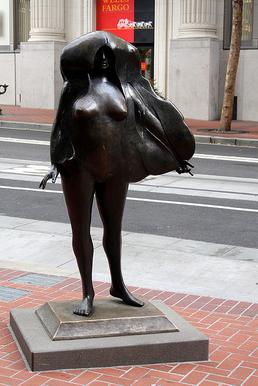
Kvinneakt is an abstract bronze sculpture located on the Transit Mall of downtown Portland, Oregon. Designed and created by Norman J. Taylor between 1973 and 1975, the work was funded by TriMet and the United States Department of Transportation and was installed on the Transit Mall in 1977. The following year Kvinneakt appeared in the "Expose Yourself to Art" poster which featured future Mayor of Portland Bud Clark flashing the sculpture. It remained in place until November 2006 when it was removed temporarily during renovation of the Transit Mall and the installation of the MAX Light Rail on the mall.

Shemanski Fountain, also known as Rebecca at the Well, is an outdoor fountain with a bronze sculpture, located in the South Park Blocks of downtown Portland, Oregon, in the United States. The sandstone fountain was designed in 1925, completed in 1926, and named after Joseph Shemanski, a Polish immigrant and businessman who gave it to the city. Carl L. Linde designed the trefoil, which features a statue designed by Oliver L. Barrett. The sculpture, which was added to the fountain in 1928, depicts the biblical personage Rebecca. Shemanski Fountain includes two drinking platforms with three basins each, with one platform intended for use by dogs.

Nepenthes is a series of four sculptures by artist Dan Corson, installed in 2013 along Northwest Davis Street in the Old Town Chinatown neighborhood of Portland, Oregon, in the United States. The work was inspired by the genus of carnivorous plants of the same name, known as tropical pitcher plants. The sculptures are 17 feet (5.2 m) tall and glow in the dark due to photovoltaics.

Thompson Elk Fountain, also known as the David P. Thompson Fountain, David P. Thompson Monument, Elk Fountain, the Thompson Elk, or simply Elk, was a historic fountain and bronze sculpture by American artist Roland Hinton Perry. The fountain with its statue was donated to the city of Portland, Oregon, United States, in 1900 for display in Downtown Portland's Plaza Blocks. It was owned by the City of Portland.
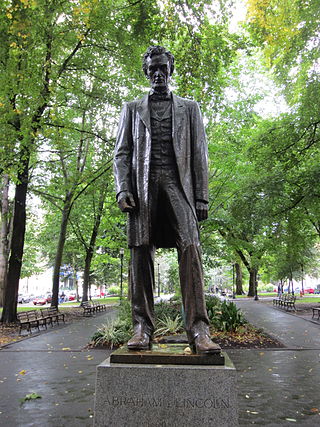
A bronze statue of Abraham Lincoln by George Fite Waters was installed in Portland, Oregon's South Park Blocks, in the United States, until 2020. The 10-foot statue was donated by Henry Waldo Coe.
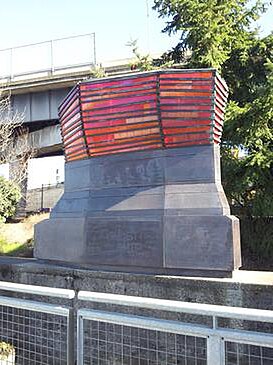
Ghost Ship is an outdoor 2001 sculpture by James Harrison and Rigga, a group of local artists, located along the Eastbank Esplanade in Portland, Oregon. It is made of copper, stainless steel, art glass, and two lamps. It is part of the City of Portland and Multnomah County Public Art Collection courtesy of the Regional Arts & Culture Council.

Echo Gate is an outdoor 2001 sculpture by Ean Eldred and the architectural firm Rigga, located along the Eastbank Esplanade in Portland, Oregon, United States. It was funded by the City of Portland Development Commission's Percent for Art program, and is part of the City of Portland and Multnomah County Public Art Collection courtesy of the Regional Arts & Culture Council.

Talos No. 2 is an outdoor 1959–1977 bronze sculpture created by the American artist James Lee Hansen. It is located in the Transit Mall of downtown Portland, Oregon, in the United States.

Royal Rosarian is an outdoor 2011 bronze sculpture by American artist Bill Bane, located at the International Rose Test Garden, Washington Park in Portland, Oregon, United States.

Stack Stalk is an outdoor 2001 sculpture by Ean Eldred and the architectural firm Rigga, located along the Eastbank Esplanade in Portland, Oregon.
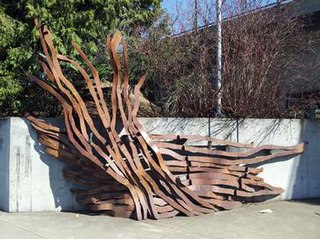
Alluvial Wall is an outdoor 2001 sculpture by Peter Nylen and the architectural firm Rigga located along the Eastbank Esplanade in Portland, Oregon.
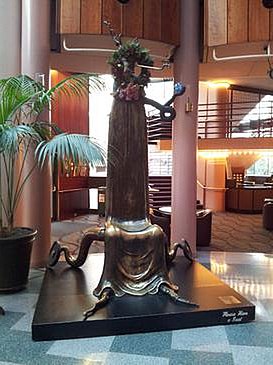
Mago Hermano (Brother Wizard or Magician) is a 2003 bronze and steel sculpture by Mexican artist Alejandro Colunga, located in the lobby of Antoinette Hatfield Hall (part of Portland Center for the Performing Arts), at 1111 Southwest Broadway, in Portland, Oregon, United States.

A 1926–27 statue of George Washington by Italian American artist Pompeo Coppini was installed in northeast Portland, Oregon, United States. The bronze sculpture was the second of three statues of Washington by the artist, following a similar statue installed in Mexico City in 1912 and preceding another installed on the University of Texas at Austin campus in February 1955. The Portland statue was created to commemorate the 1926 sesquicentennial of the Declaration of Independence and dedicated in 1927. It was part of the City of Portland and Multnomah County Public Art Collection. In June 2020, it was toppled by protestors.

City Reflections is an outdoor 2009 bronze sculpture by Patti Warashina, located in downtown Portland, Oregon.
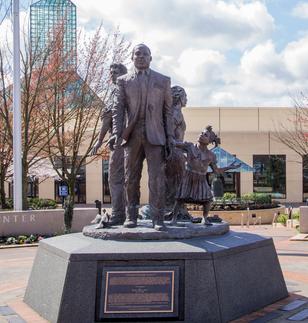
The Dream, also known as the Dr. Martin Luther King Jr. Memorial Sculpture, is an outdoor bronze sculpture of Martin Luther King Jr. by Michael Florin Dente, located outside the Oregon Convention Center in Portland, Oregon. The 8-foot (2.4 m) memorial statue was dedicated on August 28, 1998, the 35th anniversary of King's "I Have a Dream" speech. It depicts King plus three allegorical sculptures: a man who symbolizes the American worker, a woman who represents immigration, and a young girl shown releasing King's coattail, who represents, according to Dente, the "letting go" that occurs when people sacrifice their time and energy to engage in a struggle. The sculpture is part of the City of Portland and Multnomah County Public Art Collection, courtesy of the Regional Arts & Culture Council.

A bronze sculpture of American pioneer, newspaper editor and historian Harvey W. Scott (1838–1910) by Gutzon Borglum, sometimes called Harvey Scott or Harvey W. Scott, was installed on Mount Tabor in Portland, Oregon, United States, until being toppled in October 2020.






















